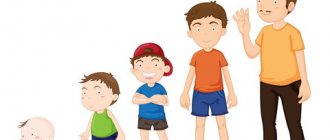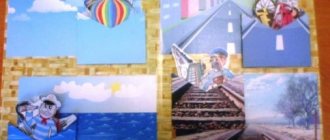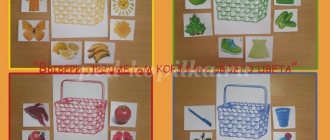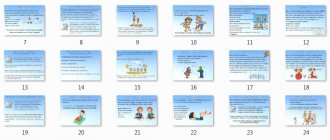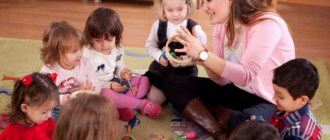Adaptation of a child to kindergarten is a complex, multifaceted process.
Some children do not experience any particular difficulties, quickly find contact with peers, and get used to the new routine of life. Other kids, due to their age characteristics, experience a change in environment extremely difficult - they become aggressive, quick-tempered, and capricious.
Both educators and parents can help with adaptation. Numerous psychological studies have made it possible to identify some patterns of this process, develop practical recommendations for adults, effective means of correcting behavior, as well as preventing the development of concomitant disorders.
The benefits of activities for children
Children perceive the world around them differently than adults. They do not yet have sufficient life experience, knowledge, and skills that would allow them to cope with a stressful situation on their own.
When solving adaptation problems, games and special activities are given special importance due to the characteristics of the leading type of activity.
The means of influence are effective in the formation:
- personal qualities;
- moral-volitional sphere;
- ways of interacting with society and the surrounding world.
In play, it is easier for a child to establish contacts with peers, overcome a stressful situation, and get rid of internal discomfort and fears. Thus, socialization occurs more naturally and more successfully.
The influence of various factors on adaptation
How long it will take a child to get used to a child care facility is influenced by many factors. Let's look at the main ones.
Child's age
The situation is such that many mothers strive to send their children to kindergarten as soon as possible and go back to work after maternity leave. Therefore, recently the need for nurseries has increased, starting to accept children from one and a half years old, which not every preschool institution has.
Most experts believe that the younger the child, the more difficult his adaptation period is, since the immune system has not yet strengthened and the need for parental care and attention has increased.
Therefore, the optimal age for starting kindergarten life is considered to be 2.5 - 3 years. And pediatricians insist that parents send their children to kindergarten no earlier than three years of age.
Read detailed material with expert opinions on this topic – Is it time to go to kindergarten? When is the best time to give up a child and what does a parent need to know?
Health status
As we have already said, children with limited health capabilities or private colds and chronic diseases have a hard time getting used to kindergarten.
Therefore, parents should postpone kindergarten and wait until the child’s body can adapt to preschool without serious consequences.
Level of development of skills and abilities
By the beginning of kindergarten life, children should have all the necessary skills and abilities: go to the potty, hold a spoon, drink from a cup, partially dress and undress themselves, and also be able to ask an adult for help.
If parents are used to doing everything for the child, it will be difficult for him to get used to independence. Accordingly, his adaptation period may be prolonged.
Level of socialization
In kindergarten, the child will have contact with a large number of children and adults. It’s good if he already has such communication experience. Otherwise, it will be very difficult for a child who is accustomed to seeing only his mother and father next to him to get used to the children's team and teachers.
How to get your child to talk if you suspect that he is being bullied or beaten in kindergarten?
Also, the duration of adaptation depends on the personality of the teacher to whom the child is assigned, the number of children in the group, the characteristics of the child’s nervous system and the atmosphere in the family.
How do they work during addiction?
The changes that occur in a child’s usual life when entering kindergarten naturally create a stressful situation.
The best way to deal with discomfort is laughter. Therefore, during the adaptation period, it is necessary to create such conditions so that each child is engaged in activities that are interesting to him, important for his development, and at the same time receive exclusively positive emotions and useful experience.
The game promotes painless adaptation of the baby to kindergarten. The transition to a preschool educational institution requires the child to undergo a qualitative, fundamental restructuring of the previously established behavioral stereotype.
When there is a separation from the familiar home environment, the child’s mental development noticeably slows down. It is important for the teacher to maintain the emotional tone of the children, to show patience, sensitivity, and kindness.
Playful activities help:
- create a positive emotional atmosphere where everyone can feel important and needed;
- reduce negative behavioral reactions - impulsivity, aggression, anxiety;
- develop useful skills;
- instill in children socially encouraged personal qualities - empathy, support, sympathy.
Playing together allows the child to find a common language with peers, discover their creative potential, and most importantly, find the advantages of being in kindergarten.
Table etiquette
During meals, the upbringing of a child is most evident. Cultured children eat carefully, do not criticize food, do not spit, or disturb others. Therefore, it is very important to leave all table games at home. Yes, and there they are inappropriate, to be honest.
- You should not talk with your mouth full, play with food or bite too large pieces (this is very dangerous). You could choke or stain your neighbor, furniture, and yourself.
- You cannot put your elbows on the table, swing on a chair, or swing your arms and legs during a meal. All games are after meals.
- Drinks should be drunk in small sips, main courses should be eaten with a fork, and soup with a spoon. This is obvious to you, but often the child makes mistakes even in such trifles.
- After eating, wipe your lips and hands with a napkin. After eating, you need to go to the toilet and rinse your mouth so that all food particles are removed.
- You can't talk bad about food and offend chefs. After eating, you need to thank and put away the dishes.
If a child doesn’t like the food, he should tell his parent about it after class, and not shout at the whole Ivanovskaya.
If he cannot eat at all, you need to tell the teacher that he cannot eat, otherwise he will feel bad. In such cases, the employee will not force him to eat food. In some children's institutions, children set the table themselves. In this case, you need to explain to the child that he cannot run, dance, or be distracted when he is carrying a plate. Otherwise, injury cannot be avoided, and all the contents will fall out onto the floor.
Recommendations for carrying out
The initiator of any organized activity for children is always an adult. However, when conducting games or activities, it is important to adhere to certain rules .
Only if they are followed will group therapy be effective and achieve the desired results.
- Children should be rested, well-slept, and in a good mood.
- Organization of a safe space - freedom of movement, absence of nearby objects that could harm the child’s health.
- Teaching materials – toys, music, cards, etc.
- The course of a lesson or game should include: breathing exercises, warm-up and other methods of relieving tension.
- Simple instructions that a child can understand, taking into account age-related developmental characteristics.
- Stimulants, methods of encouragement - in no game there should be losers and winners, every child should find himself in a situation of success.
- Group principle - every student should be involved in the activity.
At the end of each lesson, self-reflection is required. Children must express their own opinion regarding the completed game - whether they liked it or not, why, what was missing, etc.
Examples
Modern psychology has a wide range of functionality that makes it possible to facilitate the process of a child’s adaptation to kindergarten. Some games and activities are aimed at relieving nervous tension, teaching ways to overcome aggression and anxiety, others - at uniting the children's team, etc.
Let's get acquainted
The exercise develops the desire to interact with peers, treat each other with respect, and allows you to feel like a full-fledged, integral part of the team.
Progress:
- Pupils stand in a circle.
- The person who will start the game is determined by drawing lots.
- The child turns to the right or left and gets to know his neighbor, passing a toy or ball into his hands - he says his name, talks a little about himself (interests, hobbies, favorite cartoon or fairy tale).
- The game continues until each of those present tells about themselves.
Remember the name
The lesson is aimed at remembering names and increasing self-esteem.
Progress:
- Children sit in a circle.
- The person who will start the game is determined by drawing lots.
- The child says his name, and the rest, clapping their hands for each syllable, repeat.
- The one who sits on the right or left continues next.
Thus, each student will be able to be in the circle of attention, have fun, and feel like a member of the team.
Together - more fun, easier, better
The exercise helps you feel that a close-knit group is a suitable place to study and play, and that it is more interesting and fun to spend time with other children. At the same time, motivation to attend kindergarten also develops.
Progress:
- Children stand in a circle, holding hands.
- At the teacher’s signal, they must synchronously perform certain movements - raise their arms up, sit down, step forward or backward, sway slightly from side to side (to the right or left, at the command of an adult).
Children will never follow the teacher’s instructions without meaning or will do it with obvious reluctance. In order for the exercise to have a positive effect, conditions should be set :
- Let's imagine that we all together, holding hands, form one big, mighty tree.
- Listen to how its leaves rustle when the wind blows (sway).
- Feel how it lives and breathes (they walk in a circle and back, raise their hands to sigh).
- When there are many of us, we help each other, we feel supported, we are not afraid of anything, like a big tree is afraid of the strongest wind.
- Together, in kindergarten, we feel calm and pleasant.
Life of a child in kindergarten
Life of a child in kindergarten
The importance of preschool education
How we want to see our future largely depends on us and the principles that we instill in the minds of children. What a person is, such is his activity, such is the world he creates around himself.
Childhood is a unique period in a person’s life; it is during this time that health is formed and personality develops. Childhood experiences largely determine a person's adult life.
In our age of computer technology, it becomes more and more difficult for a person to adapt to many factors. That is why, the sooner and more often each person begins to develop, the greater success he can achieve in his development, building a career and in his life.
Preschool preparation makes it possible from a young age to instill in a child an interest in the world around him, a thirst for knowledge and an independent determination of assigned tasks.
It is necessary to start preschool education programs as early as one and a half years old and successfully continue until the age of seven, when the child continues his education in the first grade.
Having received an excellent preschool education, children come to school well prepared, learn the curriculum better, and quickly achieve good grades in their studies.
Many parents believe that they can provide proper preparation for their child themselves. However, do not underestimate the importance of preschool education, because in kindergarten work is carried out in a group format, surrounded by other children, and this is exactly what awaits your child when he goes to school.
The key role of preschool education is to create conditions for the formation of a harmonious, spiritually rich, physically healthy, developed personality with aesthetic consciousness, creative abilities for individual self-expression through creative activity.
They say that children are the flowers of life. And adults are gardeners. And only how we invest the good and protect from the bad depends on how our flower will grow.
During preschool age, it is very important to develop basic mental processes such as memory, perception, thinking, speech. The program “From birth to school” is an innovative general educational program document for preschool institutions. In the foreground is the developmental function of education, which ensures the development of the child’s personality. The teacher focuses on the individual characteristics of the child. The primary goal of a kindergarten is to create favorable conditions for a child to fully enjoy preschool childhood, form the foundations of a personal culture, comprehensive development of mental and physical qualities, prepare for life in modern society, for studying at school, and ensure the safety of a preschooler’s life.
It is very important that the child develops not only fully, but also comprehensively: the physical and intellectual development of the baby. So, for example, many activities in kindergarten are focused on developing the child’s gross and fine motor skills. Both of them are equally important and significant in the process of development of a preschool child.
Great importance is attached to the development of fine motor skills in children in kindergarten. The level of development of the child’s speech depends on how well it is developed. It has been proven that it is at the age of 1.5-3 years that the child is most susceptible to active speech development.
The intellectual and creative development of children in kindergarten is of great importance. A number of different techniques used by educators in their work are aimed at this.
In kindergarten, the child develops as a social personality. It is easier for a socially developed child to contact the outside world. What allows a child to quickly settle into society? First of all, the baby’s skills and abilities to serve himself independently. The activities of kindergarten teachers are aimed at developing these skills and abilities, at developing independence in the child.
Another area of activity is the physical development of children. Active outdoor games, sports competitions and physical education classes contribute not only to the physical development of the child, but also to strengthening his health and the body's defenses.
In general, we can conclude that a child’s presence in kindergarten has a positive effect on his development, and that kindergarten is the most appropriate environment for acquiring knowledge and skills.
Interaction between teacher and family
The concept of modernization of Russian education in the current period emphasizes the exclusive role of the family in solving the problems of education.
The Law of the Russian Federation “On Education” states “Parents are the first teachers. They are obliged to lay the foundations for the physical, intellectual and moral development of the child’s personality already in infancy.”
The concept of “education” is considered today from different positions, various definitions of educational competence are given, each author has his own vision. However, in Russian culture and pedagogy, the meaning of education has always been associated with the spiritual growth and development of a person, moral formation and personal development.
For a child, the spiritual center and moral foundation is the family, its values, foundations, relationships - the family way of life. Therefore, it is no coincidence that in recent years the work of an educational institution with families has become especially important and significant.
Cooperation between the teacher and parents is the key to successful educational activities with preschoolers, since the family has a significant influence on the development of the child’s personality. Making parents active participants in the pedagogical process is one of the main tasks of the educator.
The task of the educator is to help parents understand their parental and educational mission as the greatest responsibility for the future of the child. It is also important that raising preschool children in a family is a single, inextricable process.
The need and importance of cooperation between family and kindergarten has never been questioned.
The effectiveness of preschool educational institutions in educating children largely depends on the extent of interaction with the family.
The teacher plays a huge role in organizing cooperation between the preschool educational institution and the family. It is his work that determines how much the family understands the actions carried out by the preschool educational institution in relation to the education of children and participates in their implementation. One of the most important tasks of a teacher is to promote unity, family cohesion, establish mutual understanding between parents and create comfortable, favorable conditions for the development of the child. A successful solution to this problem is possible if the basis of educational work is the idea of cooperation between educators, parents and children.
Children, parents, teachers are members of one team. We are united by common concerns and problems, the outcome of which largely depends on the nature of their interaction.
Cooperation between the teacher, children and parents is realized in various forms of joint activities:
- parent meeting once a quarter;
— individual conversations (as necessary);
— consultations;
— organizing joint activities of parents and children (once a quarter): involving parents in holding holidays, organizing excursions, and doing socially useful work in a group;
— organizing the work of the parent committee;
— encouraging parents for cooperation (at the end of the quarter, at the end of the school year).
It is necessary to provide assistance to parents in raising children because the majority of parents are non-professional educators; they require pedagogical and psychological assistance in solving educational problems. At the same time, parents need to be familiarized with the content and features of the educational process. As a result, parents become active members of the group and are involved in joint activities with their children.
Reasonable alternation of various forms of joint activities leads to the fact that children and parents are not afraid to have a frank conversation with each other, all problems are solved together.
When organizing joint activities of parents and children, we must try to ensure the formation of friendly and mutually interested relationships in the family, and involve parents in solving children’s problems.
Work with parents can be done through collective, group and individual forms of interaction. For example, a discussion of any parenting problem at a parent meeting can be continued during individual meetings with parents, as well as in consultations.
Particular attention should be paid to individual forms. Since it is in individual communication that parents become more imbued with anxieties and problems and subsequently become allies of the teacher. All parties benefit from successful interactions. The following can be considered a positive result of cooperation in a group:
— respect from parents for the teaching staff;
- improving interpersonal relationships, increasing authority in the eyes of children;
- greater satisfaction with the work done together, a more creative approach to it;
- better knowledge by parents of children and educational programs, a sense of their importance in kindergarten; strengthening families and improving communication with children;
- a better attitude of children towards the development of their knowledge and skills, successful social status.
Success in the work of a teacher with a pupil’s family will be when relations with parents are built on high respect for the interests of the family, parental authority, on full assistance to the family in its spiritual enrichment and thereby in its cultural and moral influence on children.
There will be a great effect in the interaction between the family and the teacher if the teacher gives the opportunity to take initiative and supports parents in all matters in the group. When communicating with a group of parents, the teacher must show courtesy and correctness, and the ability to restrain his emotions. Only then can you count on the support of parents in all activities carried out in the group. When starting to work with families of pupils, it is necessary to discuss the rules of communication that the teacher will follow when working with parents.
The result of the teacher’s work on interaction between family and kindergarten is manifested in different aspects:
- improving relationships with the child, mutual understanding;
- what place the child occupies in the life of his parents, whether he feels protected and safe in it;
- in the parent’s awareness of the importance of the role of mom or dad, and then of their activities, parental responsibility, which extends not only to their child, but also to other children;
- in the optimistic view of parents on solving family problems and the formation of parental pedagogical reflection;
- in the manifestation of parental solidarity, cohesion, activity in the educational process.
The interaction between the preschool educational institution and the family should contribute to the development of a modern kindergarten, on the one hand, and on the other hand, mean a turn of society towards the needs of the family.
We, educators, understand perfectly well that parents have entrusted us with their most precious treasure - their children, and our duty is to justify this trust, and this is only possible with close cooperation, commonality of affairs, mutual understanding of all parties, which is what we strive for.
“Our mission is to protect a child’s heart from bitterness, troubles and suffering” (V. A. Sukhomlinsky).
Only equal creative interaction between an educational institution and the families of students is the key to the full development of a child.
Consequences of therapeutic effects
Special games and exercises effectively help cope with stress , which caused the process of adaptation to kindergarten. Therapeutic methods have repeatedly proven their usefulness in practice, allowing one to overcome many difficulties painlessly.
The result of the work directly depends on the suitability of the chosen exercise to the age characteristics and interests of the children. If an adult makes a mistake, the desired effect will not be achieved no matter how hard he tries.
What is adaptation?
Imagine the world of a small child. Beloved mom and dad, familiar toys, a warm bed, familiar surroundings and daily routine.
And suddenly one day everything changes. His mother takes him to an unfamiliar place and leaves him with a strange aunt. Everything in this place is foreign - the toys, the crib, and the food are not the same as at home. And most importantly, there are a lot of unfamiliar children there, who often cry, and some may even offend. At this point you need to listen to the teacher and do everything she says. This place is called kindergarten...
⠀
Finding himself in an unfamiliar environment, the child is in a state of extreme stress. In order for him to get used to it, he must go through a period of adaptation. This term means the ability to adapt to environmental conditions, to adapt to them.
During adaptation, the activity of almost all systems of the child’s body undergoes a restructuring.
Adaptation of a child to the conditions of a kindergarten is usually accompanied by the following phenomena:
- regression of skills occurs (the child temporarily “forgets” how to go to the potty, hold a spoon, etc.);
- sleep and appetite worsen;
- the child looks depressed, lethargic, lethargic;
- frequent whims, hysterics for any reason.
There are 3 categories of children. For some, adaptation problems begin immediately, for others - after 2-3 weeks, for others there are no visible changes. This is due to many factors and depends on the adaptive capabilities of the child’s body.
You should not be afraid of changes in the behavior of your son or daughter. In this way, the child’s body copes with the stress and adapts to new conditions.
Degrees of adaptation
Designed by Freepik
There are mild, moderate and severe degrees of adaptation of a child to kindergarten.
Easy degree
A child with a mild degree adapts on average in 2-4 weeks. An easy degree of adaptation will be characterized by the following indicators:
- Sleep : the child sleeps peacefully during daytime and nighttime sleep, may sometimes wake up, but easily falls asleep again.
- Appetite : good, may be selective in dishes.
- Emotional state : even, calm.
- Behavior : without tears or hysterics, he lets go of his mother and remains in the group. Can keep himself busy playing.
- Communication with adults and peers: makes contact with teachers and children, can ask the teacher for help, gets involved in games with peers.
Even with a mild degree of adaptation, the child may initially experience sleep and appetite disturbances.
Average degree
The average degree of adaptation lasts more than a month. The child is often sick, and getting used to kindergarten is difficult due to long breaks.
Adaptation of moderate severity can be judged by the following criteria:
- Sleep: the child sometimes does not sleep during quiet hours; if he falls asleep, his sleep is restless and intermittent.
- Appetite: may refuse some dishes, eats little.
- Emotional state: often cries, is sad, mood changes for minor reasons. Can keep himself busy with the game, but for a short time.
- Behavior: has difficulty parting with his mother, and after she leaves he stands alone at the window for a long time.
- Communication with adults and peers: shows no interest in communication, constantly asks the teacher if mom will come soon.
A child with a severe degree of adaptation may take more than 2 months to get used to kindergarten, or may not get used to it at all. Then doctors recommend refusing to attend preschool.
Severe degree
Severe addiction is typical for children with disabilities.
The fact that it is not easy for a child to adapt to kindergarten can be judged by the following indicators:
- Sleep : the child does not sleep during quiet hours. At night, sleep is restless, intermittent, and there are night terrors.
- Appetite : decreased, may refuse to eat.
- Emotional state: depressed, the child seems to withdraw into himself or, on the contrary, is aggressive.
- Behavior: after mom leaves, she cries, screams, does not want to go into the group, and can sit in the locker room for a long time.
- Communication with adults and peers: does not make contact or shows aggression towards children and adults.
The completion of a child’s adaptation period can be judged by the stabilization of all indicators.
Make sure that your child's adaptation is going smoothly or check if he has any problems so that you can help in time. Use the “Where are my children” application in combination with a children's smart watch - instantly contact your child, listen to the sound around you and always know where he is.
Stages of addiction
The process of a child getting used to kindergarten takes place in several stages.
Stage 1 – period of maladjustment. No matter how the parents prepare the child for the nursery, at first he will still be in a state of stress and constant tension. It is difficult for a child to part with his parents; he often cries and is capricious. Colds may begin.
Stage 2 – adaptation period. The protective mechanisms of the psyche are triggered, the child begins to communicate with the teacher and other children, participates in games, but still misses his parents and often asks about them. At this stage, the baby is just beginning to get used to the new rules, so he may violate discipline and refuse to comply with the teacher’s demands.
Stage 3 – compensation period. The adaptation process is completed, the child gets used to the children's team, teachers and the new daily routine, and calmly lets his parents go for the whole day. The emotional background stabilizes, physiological indicators return to normal.
How long each stage will last depends on the individual characteristics of the baby.
